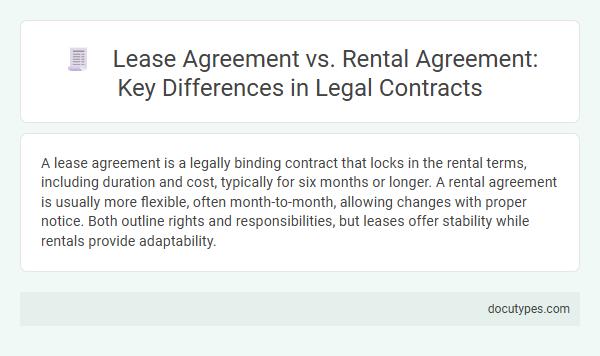A lease agreement is a legally binding contract that locks in the rental terms, including duration and cost, typically for six months or longer. A rental agreement is usually more flexible, often month-to-month, allowing changes with proper notice. Both outline rights and responsibilities, but leases offer stability while rentals provide adaptability.
Introduction to Lease and Rental Agreements
Lease and rental agreements are legal contracts that outline the terms for using a property. A lease agreement typically involves a fixed term, often lasting six months or a year, offering stability for both parties. Your choice between a lease and a rental agreement depends on the desired length and flexibility of your stay.
Definition of Lease Agreement
What is the definition of a lease agreement? A lease agreement is a legally binding contract between a landlord and a tenant outlining the terms for leasing a property for a fixed period. It specifies the duration, rent amount, responsibilities, and conditions for both parties involved.
Definition of Rental Agreement
A rental agreement is a contract between a landlord and tenant outlining the terms and conditions for renting a property. It typically covers a short-term arrangement, often month-to-month, allowing flexibility for both parties.
This agreement specifies rent amount, payment due dates, and rules for property use. It is less formal than a lease agreement and can be modified or terminated with short notice.
Key Legal Distinctions Between Leases and Rentals
A lease agreement and a rental agreement are both legal contracts used for property rental, but they differ significantly in terms of duration and legal obligations. Understanding these key legal distinctions helps landlords and tenants know their rights and responsibilities.
- Duration of Agreement - A lease agreement typically spans a fixed term, such as one year, legally binding both parties for that period.
- Flexibility - Rental agreements are usually month-to-month, allowing either party to terminate or modify terms with proper notice.
- Legal Protections - Leases offer stronger legal protections due to their fixed term, limiting sudden changes in rent or eviction without cause.
Recognizing these differences ensures clearer expectations and legal compliance in rental relationships.
Duration and Flexibility of Terms
A lease agreement typically spans a fixed duration, such as six months or a year, offering stability for both parties. Rental agreements usually have shorter, often month-to-month terms, providing more flexibility.
Lease agreements bind you to the terms for the entire duration, limiting changes until the contract ends. Rental agreements allow modifications or terminations with shorter notice periods, adapting to your changing needs. This flexibility makes rental agreements ideal for temporary living situations, while leases suit long-term commitments.
Termination and Renewal Provisions
| Aspect | Lease Agreement | Rental Agreement |
|---|---|---|
| Termination Provisions | Lease agreements typically have fixed terms, such as 6 months or 1 year. Termination before the end date usually requires a breach of contract or mutual agreement. Early termination may involve penalties or forfeiture of deposits depending on the lease terms. | Rental agreements are often month-to-month, allowing either party to terminate with proper notice, usually 30 days. Termination is more flexible and does not usually involve penalties unless stated otherwise. |
| Renewal Provisions | Lease agreements may include automatic renewal clauses or require renegotiation at term end. Renewal often involves signing a new lease with updated terms and rent amounts. | Rental agreements typically renew automatically each month unless terminated. Renewals maintain the same terms unless the landlord provides notice of any changes. |
Tenant and Landlord Rights and Obligations
Lease agreements and rental agreements both define terms between tenants and landlords, but they differ in duration and legal obligations. Understanding your rights and responsibilities under each can help avoid disputes and ensure a smooth tenancy.
- Lease Agreement Duration - Typically, a lease agreement locks in tenant and landlord obligations for a fixed term, such as 12 months, providing security and predictability.
- Rental Agreement Flexibility - Rental agreements usually operate on a month-to-month basis, allowing either party to modify terms or terminate with short notice.
- Rights and Obligations - Lease agreements often impose stricter duties for maintenance and rent payment stability, while rental agreements offer more landlord flexibility but with similar tenant protections under local laws.
Financial Implications and Payment Structures
A lease agreement typically involves a fixed payment schedule with a set monthly rent for a predetermined period, providing stability in your financial planning. Rental agreements usually operate on a month-to-month basis, allowing for flexible payment terms that can change with each renewal. Understanding these differences helps you anticipate financial commitments and manage your budget effectively.
Use Cases: When to Choose Lease vs. Rental
A lease agreement is ideal for long-term arrangements, typically lasting six months to a year or more, providing stability and fixed terms for both parties. Rental agreements are more flexible, usually month-to-month, allowing for easier changes and shorter commitments.
Choose a lease agreement when you want predictable costs and secure occupancy over an extended period, common in home or apartment rentals. Opt for a rental agreement for short stays or when you anticipate the need to move or adjust terms frequently, such as temporary housing or vacation rentals.
What Is the Difference Between a Lease Agreement and a Rental Agreement? Infographic

